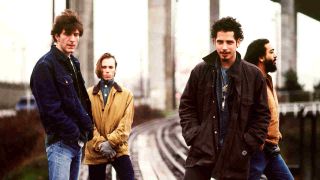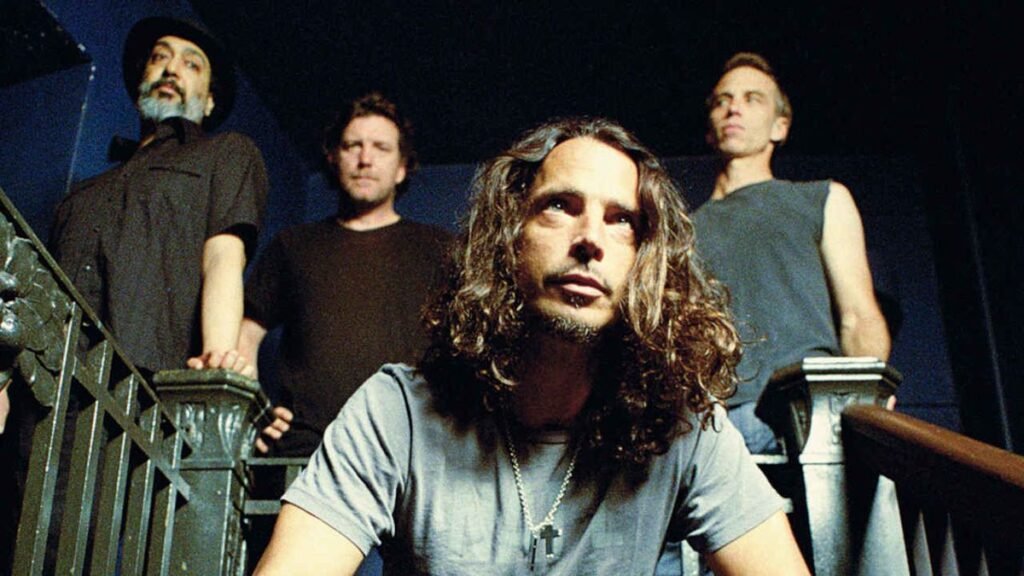Soundgarden’s reunion in 2010 and next comeback album King Animal two years later marked the go back of one of the a hit and influential bands of the final 30 years. In 2014, guitarist Kim Thayil sat down with Steel Hammer to seem again over the Seattle band’s rollercoaster occupation.
“Our track used to be no longer as digestible as Pearl Jam’s, nor as simple conceptually as Nirvana’s. You’ll want to pay attention to these bands at a membership and dance round and really feel such as you have been having a visceral enjoy with gorgeous track. You couldn’t do this with us. You set Soundgarden on when you need folks to depart your own home: ‘Right here’s Badmotorfinger. Pass house now.’”
Kim Thayil has a voice as gradual and deep as continental go with the flow. When Soundgarden’s guitarist talks about his band, his track and from time to time himself, it’s with a steamrolling and near-hypnotic deliberation. He talks it like he performs it: articulate, dense, freighted with intelligence and regularly going towards the grain of expectation. His speech mirrors the track he’s made off and on and now on once more with the band he co-founded 30 years in the past. Soundgarden have been at all times a fragment out of step with their Seattle contemporaries: much less glossy than Nirvana, extra twisted than Alice In Chains, gloomier than Pearl Jam. And, thank you in massive to Kim and his cement-clad guitar sound, heavier than the lot of ’em.
“May you consider folks partying to Soundgarden track?” he says. “This is a very non-public track, it’s one thing to percentage between shut folks. However it’s no longer truly a social track.”
If Kim seems like a philosophy graduate, it’s as a result of that’s exactly what he as soon as used to be. That used to be on the crack of dawn of the Nineteen Eighties, when he drove 2,700 miles from his local Chicago to Seattle, where he nonetheless calls house these days, to wait the College of Washington.
The son of Indian immigrants, the younger Kim immersed himself in the easiest American rock’n’roll had to provide: Aerosmith, Kiss, Ted Nugent, Affordable Trick (“However no longer Adventure. I by no means had a Adventure document.”) By the point he left for Seattle, he had graduated to punk, post-punk and hardcore: The Stooges, The Ramones, Black Flag and Chrome.

“I had a head stuffed with rock’n’roll goals once I began finding out methods to play guitar,” he recalls. “However they temporarily fritter away while you end highschool, pass off to school, get a task. I wasn’t a rich, leisure-class child. I didn’t develop as much as wealthy folks in Long island.”
Earning profits from track used to be low at the Thayil to-do checklist. A minimum of it used to be till he met Chris Cornell and authentic bassist Hiro Yamamoto and shaped Soundgarden in 1984. “It was considered one of my two nice loves, but it surely nonetheless needed to take a again seat to my different tasks on the time.”
Soundgarden’s significance within the construction of the Seattle scene is every now and then lost sight of. Whilst they weren’t the one native band twisting punk, steel and difficult rock into new shapes within the mid-80s, they turn out to be one of the crucial greatest of their homeland. The guitarist himself can take the credit score for pushing in combination Bruce Pavitt and Jonathan Poneman, the founders of Sub Pop and the architects of what would turn out to be the grunge scene. And with their 2d album, 1989’s Louder Than Love, Soundgarden was the primary in their contemporaries to free up an album on a significant label.
“We have been shouldering the good fortune of that scene in addition to probably the most grievance,” says Kim. “A few of our friends concept, ‘Are they going to be company sell-outs?’ I don’t know if it used to be a mixture of jealousy or resentment or a sense of betrayal.”
Satirically, the band who helped lay the groundwork would quickly be eclipsed by way of probably the most bands they’d impressed. 1991’s supremely warped Badmotorfinger went platinum within the wake of the good fortune of Nirvana and Pearl Jam, but it surely wasn’t till 1994’s extra brazenly business Superunknown that they in point of fact planted their dimension 11s within the mainstream awareness.
“Used to be there any jealousy that those different bands have been overtaking us? Yeah, positive,” he says, sooner than qualifying it. “A bit. However we stored issues in point of view. We weren’t schoolboys about it. We knew the folk in Pearl Jam from once they have been [proto-grunge band] Inexperienced River. And Nirvana, who have been those children who would come to our displays.”
The band’s secure upward thrust supposed that they have been, because the guitarist places it, “provided for the arena we entered”. However even because the gross sales and mag covers fastened up, he remained an enigmatic presence because the highlight inevitably shifted in opposition to the extra photogenic Cornell. A twinge of jealousy at the a part of the guitarist could be comprehensible. Regardless that on this example, it could even be fallacious.
“There used to be no longer a subject across the consideration given to Chris. It’s possible you’ll really feel something emotionally, however intellectually you place issues into point of view. If you happen to’re no longer intellectually ready for the truth that the singer is the person who will get the entire consideration, you may also no longer do it. Particularly once I distinction it to what used to be taking place within the Nirvana and Pearl Jam camps. There used to be such a lot consideration being placed on Kurt Cobain, it used to be ridiculous.”
Soundgarden suffered no nice business decline within the 3 years between Superunknown and its underrated follow-up, 1997’s self-produced Down On The Upside. However one thing had shifted internally. One of the problems used to be that Chris Cornell sought after to open out the band’s sound, whilst the guitarist most well-liked to stay the band’s heavy core intact.
“Did I ever really feel marginalised?” he says. “Against the top, sure. The method of constructing Down On The Upside used to be very uncollaborative and irritating. We have been least like a band all through that document.”

Soundgarden formally flooring to a halt on April 9, 1997. The inside track broke by way of a temporary fax that said: “After 12 years, the individuals of Soundgarden have amicably and mutually determined to disband to pursue different pursuits.”
To this point, so clichéd. However what took place subsequent used to be extra interesting. The place his ex-bandmates truly did “pursue” mentioned “pursuits”, Kim merely disappeared. One minute he used to be right here, the following – pfft – he’d vanished. And he just about stayed vanished for the following 14 years.
“I wasn’t acutely aware of that,” he says, after a second’s concept. “Extra time had transpired than I had paid consideration to. I don’t truly have a just right resolution for what I used to be doing. I used to be having a good time studying and enjoying the guitar recreationally and putting out with my buddies. I’ve at all times been curious about politics and philosophy, and after 11th of September took place, I used to be even excited about going again to university and getting a Masters in philosophy. In fact I couldn’t inspire myself to try this both.”
He didn’t somewhat pass down the total JD Salinger course: he performed on Dave Grohl’s steel fanboy side-project Probot, SunnO))) and Boris’s 2006 collaboration Altar, a monitor by way of Southern Lord doom experimentalists Ascend and, maximum particularly, teamed up with Krist Novoselic and Jello Biafra within the politically charged No WTO Combo. “I used to be at all times doing issues,” he recollects.
He says that he stayed involved with the opposite band individuals all through this era. Used to be there part of him that used to be lacking Soundgarden?
“No, there wasn’t,” he says with some conviction. “I’m nonetheless no longer lacking Soundgarden. When the band broke up, I used to be bummed out for a couple of months, but it surely went away. I didn’t really feel, ‘Gee, if most effective we have been again in combination once more.’ And I nonetheless don’t really feel that manner. I’m satisfied we’re again in combination once more, however I don’t want it. Other people must revel in corporate of other folks, no longer really feel like they want it.”
Regardless of the crucial, Soundgarden are again in combination on an it sounds as if everlasting foundation. Their comeback album, 2012’s King Animal, used to be are compatible to face with the rest they launched all through the 80s and 90s. So little modified within the intervening 14 years that you simply’d be forgiven for pondering that the hiatus by no means took place.
Regardless that no longer somewhat the whole thing is because it used to be. Chris Cornell lately mentioned that the principle distinction between Soundgarden in 1998 and Soundgarden in 2014 is the absence of alcohol. “That’s no longer true!” says Kim, his voice emerging. “Once we have been more youthful, I used to drink one or two beers simply sooner than we went on, simply to loosen up. I don’t do this any longer. I normally have my first beer on the finish of the set, simply sooner than the encore.” A pause for comedian impact. “After which the opposite 28 after the display!”
This present day, he most effective beverages alcohol on display days. “Or once I pass to a few social match with buddies. Which I don’t do this regularly.”
It’s in moments like this while you glimpse the opposite aspect of Kim: insular, anti-social, spiky. Such a one that describes individuals who preferred wrestling within the 80s and 90s as “knuckleheads and goofballs”. Such a one that loves punk rock and underground steel just because it exists – and who nonetheless will get fascinated with it.
“When I used to be a teen, there have been 100 steel bands,” he says. “Now there’s masses of hundreds in every single place the arena. There are as many punk rock bands. There’s no longer much less rock’n’roll. There’s extra rock’n’roll. It will possibly most effective be a just right factor.”
Firstly revealed in Steel Hammer 258


